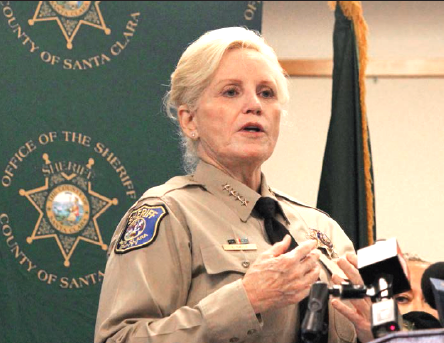
BY BRADEN CARTWRIGHT
Daily Post Staff Writer
The first witness to take the stand yesterday (Oct. 3) in the trial of Sheriff Laurie Smith was Carlyle Varlack, a criminal defense attorney who said he applied to carry a concealed firearm because someone was threatening to kill him.
Varlack said he never received a response on his permit application from the sheriff’s office, and he was told that he wouldn’t get one for at least a year.
“I just wanted to be able to protect myself and family — here, now,” he testified at the Old County Courthouse in San Jose.
The second witness to testify was Chris Malachowsky, the founder of the billionaire-dollar chip manufacturing company NVIDIA and a donor to Smith’s political campaigns. Malachowsky said he was told not to fill out the “reason for good cause” section on his application to carry a concealed concealed firearm, which was approved.
“It seemed like a cool thing to have,” Malachowsky said.
He compared carrying a gun to driving a flashy car.
Malachowsky, 63, of Los Altos Hills, was cross-examined by Assistant District Attorney Gabriel Markoff, who is coming from San Francisco to prosecute an accusation of corruption against Smith, with the goal of removing her from office before her term ends in January.
With his questioning, Markoff tried to draw a connection between Malachowsky’s political and financial support for the sheriff with how easy it was for him to get a permit. That was juxtaposed with Varlack, who had no connection to Smith and saw his application sit on a shelf, despite a real need.
Monday was the second day of the trial, and the first time that witnesses outside the sheriff’s office testified.
On Friday, Sgt. Rich Glennon and secretary Linda Wallace talked about how Smith’s top deputies ordered them to process applications for politicians, athletes, judges, celebrities and friends, while outsiders would get a response that their application was still pending.
Varlack, 65, of San Jose, said a man — possibly a former client with mental health issues — called and left threats on Yelp some time in 2018.
The man said he would hang Varlack and rape his daughter, and he had a gun, Varlack said.
He parked in front of Varlack’s house late at night.
Varlack said he first went to the San Jose Police Department, but he wasn’t satisfied with the response from the people at the front desk. He said he insisted on filing a police report, then walked straight to the District Attorney’s office to talk about the threats with a victim’s advocate.
Varlack said his next step was to get a permit to carry a concealed weapon, or CCW. He said already had guns at home, but a CCW would protect him when he was out. He was ready to shoot and kill if necessary, he said.
Markoff pulled up Varlack’s application to carry a concealed weapon, which had a long, handwritten paragraph in the spot for applicants to explain why they have good cause for a CCW.
When Varlack called the sheriff’s office to ask about his application, a secretary told him he wouldn’t get a response for a year and gave him an email address to follow up with.
Varlack sent an email but said he never received a response from anyone in the sheriff’s office.
Eventually, police officers arrested the man making threats and Varlack didn’t hear from him again.
One of the key characters in Malachowsky’s testimony was Christopher Schumb, an attorney and political fundraiser for Smith. Some time around 2014, Schumb introduced Malachowsky to Smith and invited him to join the Sheriff’s Advisory Board, which is a nonprofit that buys gifts for the sheriff’s office.
Santa Clara County District Attorney Jeff Rosen charged Schumb in August 2020 with bribery and conspiracy, alleging that Schumb took donation’s for Smith’s political campaigns with the understanding that donors would get CCWs from the sheriff.
But a judge kicked Rosen off the prosecution because he was friends with Schumb, and Attorney General Rob Bonta dropped the case shortly after due to a lack of evidence.
Malachowsky testified that the sheriff never asked him for money, though he did write her campaign committee a $5,000 check after he saw a negative ad attacking her management of the jail.
“It just seemed overly personal,” Malachowsky said.
Members of the Sheriff’s Advisory Board were invited to “Best in the West,” a private event at the sheriff’s range in rural Morgan Hill, where local SWAT teams competed in tactical challenges.
Malachowsky said he went on a helicopter ride and shot guns at the event. He remembered watching a sniper shoot a balloon that couldn’t be seen without binoculars.
“Very impressive,” he said.
Allen Ruby, who is representing Smith, asked Malachowsky why he joined the Sheriff’s Advisory Board. Malachowsky gave a couple of reasons, and none of them had to do with getting a CCW permit.
Malachowsky said he owned five houses in Los Altos Hills, and sheriff’s deputies do a good job patrolling. He said he supports all law enforcement officers and particularly enjoyed being around the sheriff and her deputies.
Malachowsky received his CCW permit in May 2015, and the sheriff renewed it in 2017. He said he didn’t explain his reason for wanting a permit on his application because Schumb or someone in the sheriff’s office told him not to.
Malachowsky said he let his permit expire after two years because he only carried a gun two or three times with it. He said he didn’t like the responsibility.
